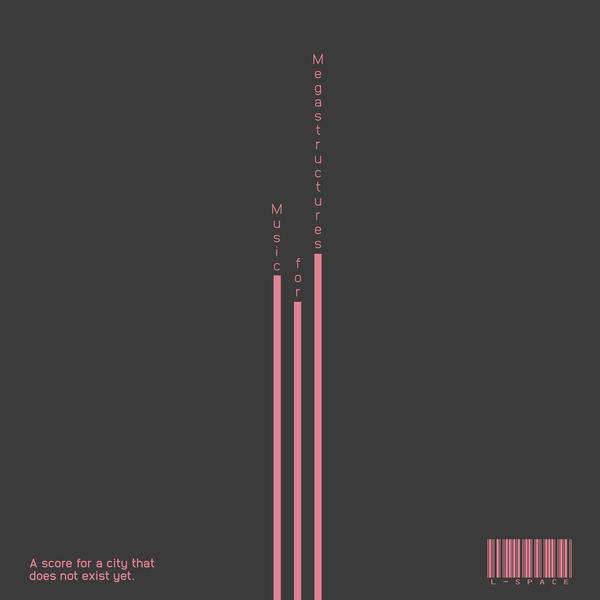If places had soundtracks, what would they be like? The question is drawn to our attention by the release of L-space’s new project, Music for Megastructures, a playful, wide-eyed score for a city that does not yet exist. Their second album, it follows up the pastoral synth-pop of 2018’s Kipple Arcadia with something more high-concept. Completely instrumental, the album is divided into four chapters, Travel, Work, Health and Life. Starting with the graceful, proggy immersion of our arrival, we move on to explore the robotic alienation of the working day, the utopian ennui of extended, transhuman lifespans and end up with our faces pressed up against the windows of the subterranean fleshpots and gambling dens where the city’s cyborg denizens go to get their rocks off. Tracks have long, often sardonic names, like ‘A Small Man Waits While the Rain Sizzles on the Tarp’ or ‘Free Body Augmentations – No Questions Asked or Answered’, a series of sketches suggestive of a wider world.
Musically, the reference points it offers are familiar. Phillip Glass is clearly a big thing in L-space’s world, and there’s more than a background hum of the Radiophonic Workshop about it all. But for all its melancholy there’s little of the lost-futures, Ghost Box Records glumness that usually accompanies this kind of retro-futurism. It drips with the kind of humour and optimism that underpinned Wendy Carlos’ score for A Clockwork Orange, or Haiku Salut’s magisterial There is No Elsewhere. L-space share Carlos’ ear for the classical, and as a result, like a city, the album feels lived-in and experienced and convinces when it could easily resort to pastiche.
Highlights include the selected ambience of ‘Lives Are Getting Longer’, and the images of Blade Runner or Metropolis conjured up by the chapter on Work. It’s a well-trodden path that leads to some unexpected interludes – the desperate chatter of ‘A Sleepy Robot Watches Over A Rarely-used Car Park’, or the ghastly squeaking of ‘The Captains of Industry and Their Interests Outside Work’. There’s a satirical intent behind the sci-fi conceit. The album climaxes ‘Sitting in A Crowded Basement Watching Automatons Approximate Music’, an eerie piano lurching into the kind of drum solo you might get if you forced a bot to watch a thousand hours of Budgie drumming on YouTube. This gives way to the aching comedown of ‘Waking Up Bathed in the Light of Things You Can’t Afford’, which drops us back into a more familiar world, uncertain that this city we just visited was entirely fictional.
Music for Megastructures doesn’t quite answer the big questions it asks, but I want it to so much that, for me at least, it kind of does. And frankly, you can only applaud the vaulting ambition that would propose this absurd enterprise in the first place. It was always going to end up something like the soundtrack to a noir-ish dystopian adventure or fast-paced indie platformer. But like the best science fiction, it offers a sharp take on the world it professes to escape from.




